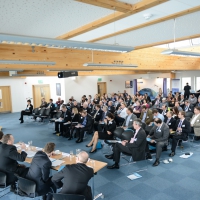Opposition vows to tackle rural connection delays to the grid while Conservatives call for offshore network to preserve landscapes
Labour is promising to “rewire Britain”, making its case to the UK’s rural communities that it will connect farmers and businesses to the National Grid at record-breaking speed.
The pledge comes as Rishi Sunak faces a battle over electricity pylons with the trade secretary, Kemi Badenoch, and former ministers urging him to pull the plug on crucial grid infrastructure.
At the Country Land and Business Association (CLA) conference on Thursday, Labour’s Steve Reed, the shadow environment secretary, will promise to get infrastructure – that is, pylons – built quickly to connect rural people to the grid. He will pledge to reduce the wait for farmers and landowners to plug their renewable energy into the grid “from years to months”.
Labour sources said they were happy to fight on the issue after speaking to “so many farmers and landowners who are stuck in the grid queue for years”.
Renewable energy companies have to wait up to a decade to connect to the electricity grid. Local farms and businesses are also stymied by the slow connection times, which are the lengthiest in Europe.
But there are fears that a new Conservative party internal row about pylon plans will cause Sunak to go slow on his aim to speed up grid connectivity.
A growing number of Tories have been raising concerns about pylons, among them the former home secretary Priti Patel, who asked in parliament this week why the National Grid could not be built in the sea.
She demanded ministers “build an offshore grid” and “pull the plug on these awful pylons”. The energy minister, Andrew Bowie, responded that an offshore grid would be more expensive and result in higher bills for customers, but said he understood the frustration of her constituents.
Patel is part of the Offshore Electricity Grid Task Force, a group of 14 MPs who are campaigning against pylons. Its members include Badenoch and the former environment secretary Thérèse Coffey.
Badenoch called for ministers to explore an offshore grid instead of onshore pylons, and Coffey said: “While I understand, for energy security, the government commitment to provide 40 gigawatts of offshore wind electricity by 2030, I’ve consistently made it clear that it’s essential our precious landscapes and communities are protected by placing the infrastructure in the appropriate location.” She also asked for an offshore grid to be contemplated.
National Grid said building the grid onshore was four times cheaper, and the Norwich to Tilbury pylon project, which will improve connections for many rural areas, would be more than £3bn more expensive if built offshore.
Simon Cran-McGreehin, the head of analysis at the Energy and Climate Intelligence Unit, said an offshore grid without onshore pylons made no sense. He said: “The proposed grid investments already include coordinated undersea cables to connect up the UK’s vast offshore wind potential – but at some point those lines have to come onshore to reach customers, otherwise it’s like a ring-road without any routes into town.”
Groups of angry constituents are also rallying against pylons. In September, hundreds of people protested in Suffolk over plans to speed up grid connections by building pylons. They complained that their area would be “destroyed” by the pylons and said renewable energy needed to be transported in a “green way”.
Chris Venables, the deputy director of politics at the campaign group Green Alliance, said: “It should be a shared, cross-party national mission to secure our energy independence, and the route to this is through clean, cheap renewable power. Expensive fossil fuels have wreaked havoc on the economy and pushed up bills for millions, so rapidly building out the power grid to accommodate new clean energy is a top priority.
“People have genuine concerns about democracy in the planning process, and communities must feel the benefit from the energy transition, but we cannot afford to slow down. It’s politicians’ job to broker the deals needed to move us forward, not grandstand with unworkable propositions. Until we move beyond the current impasse, millions of people will continue to face sky-high energy bills.”
A Department for Energy Security and Net Zero spokesperson said:“We’re driving forward the biggest reforms to our electricity grid since the 1950s – halving the time it takes to build networks, speeding up grid connections, supporting thousands of jobs and reducing bills in the long-term for families.
“Households helping host crucial infrastructure could receive £1,000 off their electricity bills alongside benefits for their local community in recognition of their role in delivering cleaner and cheaper energy to homes and businesses.”
Sourced by: theguardian.com












